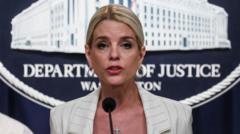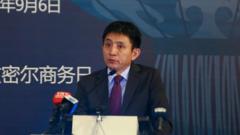In a worrying echo of past market turmoil, rising U.S. Treasury yields signal potential risks associated with President Trump's recent tariff announcements reminiscent of Liz Truss' brief and troubled premiership.
U.S. Treasury Yields Rise Amidst Tariff Concerns: A Stark Comparison to Liz Truss' Downfall

U.S. Treasury Yields Rise Amidst Tariff Concerns: A Stark Comparison to Liz Truss' Downfall
Investors react to Trump's tariff policies as bond market stability wavers.
April 9, 2025, 6:15 a.m. ET
The landscape of U.S. financial stability may be shifting dramatically as bond yields rise amidst President Trump's imposition of new tariffs. This situation bears unsettling similarities to former British Prime Minister Liz Truss's tenure, which was marked by significant market upheavals following her proposed tax cuts funded by extensive borrowing. The prospect of a credit crisis loomed large then, ending Truss's leadership in mere weeks.
As Trump's latest tariffs kick in—with rates exceeding 100% on imports from China—the yield on the 10-year U.S. Treasury climbed to approximately 4.5%, up from just around 3.9% pre-announcement, while 30-year bonds briefly hit above 5%. Though these yields remain below those observed during Trump's inauguration, analysts warn that a continued decline in treasury values could mirror the chaotic aftermath experienced in the U.K. back in 2022.
During the initial response to Trump's tariffs, bond yields had dropped slightly, contradicting typical market behavior as stock prices fell and the dollar weakened. This response was seen as a vestige of the American bond market's reassured status. However, this perception appears to be eroding, igniting fears of increased pressure on the Federal Reserve to step in and stabilize the market—similar to actions taken by the Bank of England during Truss’s administration.
While Truss ultimately rescinded her economic policies leading to a restoration of calm in the markets, the damage to her political standing was irreversible, culminating in her resignation after just 44 days. In stark contrast, Trump shows little inclination to reverse his tariff policies, and it appears there are limited political channels to compel him to do so. Investors will be watching closely as these issues unfold, their outcomes poised to impact broader economic stability.
Mark Landler is the London bureau chief for The Times and has dedicated over three decades to journalism, focusing on the United Kingdom and American foreign policy.
The landscape of U.S. financial stability may be shifting dramatically as bond yields rise amidst President Trump's imposition of new tariffs. This situation bears unsettling similarities to former British Prime Minister Liz Truss's tenure, which was marked by significant market upheavals following her proposed tax cuts funded by extensive borrowing. The prospect of a credit crisis loomed large then, ending Truss's leadership in mere weeks.
As Trump's latest tariffs kick in—with rates exceeding 100% on imports from China—the yield on the 10-year U.S. Treasury climbed to approximately 4.5%, up from just around 3.9% pre-announcement, while 30-year bonds briefly hit above 5%. Though these yields remain below those observed during Trump's inauguration, analysts warn that a continued decline in treasury values could mirror the chaotic aftermath experienced in the U.K. back in 2022.
During the initial response to Trump's tariffs, bond yields had dropped slightly, contradicting typical market behavior as stock prices fell and the dollar weakened. This response was seen as a vestige of the American bond market's reassured status. However, this perception appears to be eroding, igniting fears of increased pressure on the Federal Reserve to step in and stabilize the market—similar to actions taken by the Bank of England during Truss’s administration.
While Truss ultimately rescinded her economic policies leading to a restoration of calm in the markets, the damage to her political standing was irreversible, culminating in her resignation after just 44 days. In stark contrast, Trump shows little inclination to reverse his tariff policies, and it appears there are limited political channels to compel him to do so. Investors will be watching closely as these issues unfold, their outcomes poised to impact broader economic stability.
Mark Landler is the London bureau chief for The Times and has dedicated over three decades to journalism, focusing on the United Kingdom and American foreign policy.






















